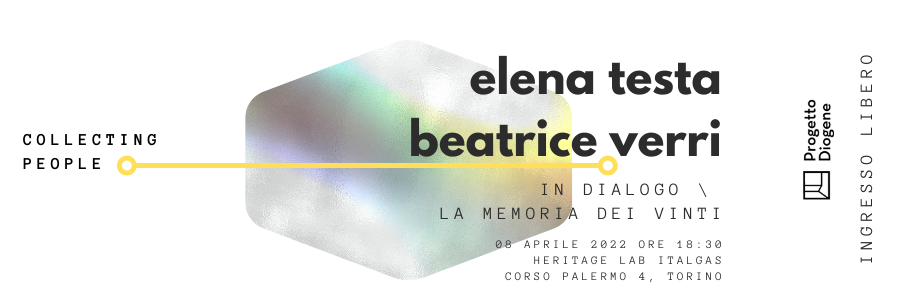Collecting People | La memoria dei vinti. Elena Testa & Beatrice Verri

Friday, April 8th, 6.30 PM
Heritage Lab Italgas, Corso Palermo 4, Torino
The need to archive and preserve accompanies any human, private and collective activity.
Often the future use of information and documents is not foreseeable; it is therefore necessary to form the awareness that even the disorder of the data, the partial or total loss of information, the deliberate destruction are possible acts with circumstances to be managed.
Jaques Derrida since the mid-nineties, focuses his reflection on the archive,
identifying between the accumulation / loss polarity the multiplicity of logics and perspectives inherent in the need to archive. Derrida begins the discussion from the etymology of the term ‘archive’ focusing on the remote meanings, those contained in the Greek word Archè, which on the one hand means beginning, principle, origin understood in the sense of initiation or beginning, on the other it means command, principle authorizing or legislating which implies commanding, controlling and putting order. The word archive, however, also comes close to the term Archeion, which indicates the residence of the supreme magistrates of Ancient Greece: in the Archeion, a dedicated and publicly recognized place, the official documents of the city are deposited, of which the Archons are the custodians and interpreters . Through the link with the Archon, Derrida underlines how the archives are the testimony of the way in which power is configured:
the archive not only includes and preserves, but is also evidence of a story of exclusion of what is not collected, or that having been collected is then discarded.
With Beatrice Verri and Elena Testa we will try to discuss the issue of the archive space as a place of thought and perspective of historical project, as a critical system that looks to the future: data, information, documents are not just quantities, but first of all they are devices that tell stories, and to know how to read them you need to know, compare and interpret by making choices.
The family films collected and preserved in the project I remember – the archive of all of the National Cinema d’Impresa are an attempt to resist loss: it collects and digitizes family films, to rediscover the visual evidence of our recent past , keep them and propose them again. Over the decades, the images of workplaces, family and group rituals, once created for the continuity of affections and relationships, become evidence of the evolution of an entire community, that is, they become “history”. I remember trying to reconstruct a collective narrative in individual and family memories, to reconstruct social transformations. Likewise, the Nuto Revelli Foundation preserves and enhances one of the most important archives
Orals of Italy and was created to carry forward the values that Revelli – an Alpine in Russia, partisan, researcher of peasant memory, witness of contemporary Italy – carried forward with his work. The Foundation preserves and enhances more than a thousand hours of recordings, recently restored and digitized, as well as seventy linear meters of photographs, letters, testimonies on the Second World War, on the struggle for liberation from Nazi-fascism, on the Alpine troops in Russia, on the peasant world.
The work of collecting oral testimonies by Nuto Revelli gave voice to his marginalized protagonists in the volumes The world of the vanquished. Testimonies of peasant life (1977) and The Strong Ring. The woman: stories of peasant life (1985) that represent the patient collection of the stories of the vanquished: in the words of the interviewees by Revelli – the peasants and mountaineers of the Cuneo valleys, the women of the poor countryside, the losers of all time – we perceive the complexity of the human condition, the drama of memory.
Through the spontaneous dialogue between personalities and different but similar researches, we will try to find meeting points that can in some way act as humus for contemporary artistic research.
Elena Testa is in charge of the National Cinema Impresa Archive of Ivrea, department of the Experimental Center of Cinematography Foundation. You are involved in the conservation, archiving, reuse and enhancement of repertoire film material. She is an expert in corporate cinema and the relationship between cinema and the world of work, she has written documentaries, directed short films and curated reviews for festivals and cultural institutions.
Beatrice Verri, translator and editorial curator, is also Director of the Nuto Revelli Foundation for which she coordinated the process of alpine regeneration based on culture of the historic village of Paraloup in Valle Stura, of which she is in particular responsible for the “Ring Strong” Laboratory for memory of mountain women. On the theme of female historical memory, you have carried out research, written contributions and edited the dedicated section of the Paraloup Tales Museum. You are President of the Chierese Community Foundation and a member of the Governing Council of the National Association of Memory Landscapes representing Borgata Paraloup.
Collecting People
Collecting People is an initiative aimed at sharing and disseminating knowledge, through which Progetto Diogene opens up meetings and interventions, sometimes determined by the simple passage in the city of an artist, or any other figure with a high cultural profile, inclined sharing their work.
With the intention of creating new relationships in the area and activating future training connections, for the cycle of meetings Collecting People 2022, Progetto Diogene will be a guest in different spaces in the Aurora district, similar to the issues addressed from time to time in the talks.
